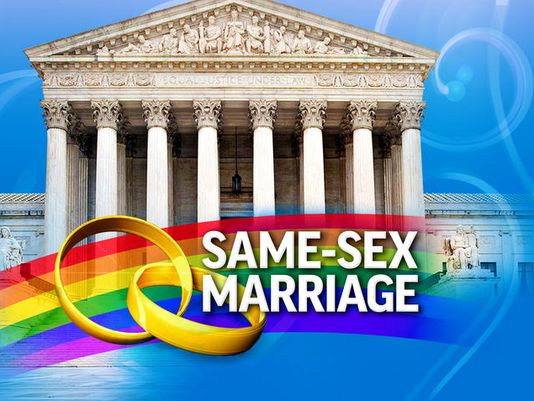April 28 is an historic day for equal marriage. We are finally getting our shot at arguing for our right to marry before the highest court in the nation, the Supreme Court of the United States (SCOTUS).
If you are a little behind on this development, here are some of the top ten things you need to know to get caught up to speed on the case tomorrow.
#1 – Mary Bonauto will be arguing the case.
Bonauto is a LGBT rights rock star. She argued the court case that brought equal marriage to Massachusetts in 2003—Goodridge v. DPH. She subsequently led the case for GLAD, Gill v. Office of Personnel Management, which was the first federal court decision striking down the Defense of Marriage Act’s federal definition of marriage, and the subsequent appellate decision too (a first)—a ruling that forced the issue before the U.S. Supreme Court earlier in 2013 and was folded into the Windsor decision that helped spark a gay marriage windfall across the U.S.
This is not her first case before SCOTUS. She also helped argue the case of Gay and Lesbian Irish Group [GLIB] of Boston vs. the Allied Veteran’s War Council of South Boston. While that case went the other way for GLIB, it helped spark the LGBT rights movement into high gear. I believe we are going to be in good hands with Mary at the helm.
#2 – Where the cases come from?
The combined case that is being heard before SCOTUS is from cases that are on appeal from: Ohio, Kentucky, Michigan, and Tennessee. The combined name of the case is: Obergefell v. Hodges.
These four states had a total of six separate lawsuits brought against them, where either state or federal courts found that their state bans on gay marriage violated the equal protection clause of the US Constitution or that the non-recognition of out-of-state same-sex marriage violated the equal protection clause.
The title case is from Ohio where a same-sex couple fought to have their marriage recognized. They were the first of the six cases to file a lawsuit against the state for recognition of their out-of-state marriage.
You can read about them and their struggle here.
#3 – What are the legal questions before the court?
First, whether bans on gay marriage are constitutional. Second, if they are, whether those states with bans may refuse to recognize out-of-state gay marriages performed where they are legal.
#4 – What are the legal arguments that might win the day?
In simple terms—bans on same-sex marriage violate the Equal Protection Clause of the U.S. Constitution. Additionally, non-recognition of out-of-state same-sex marriages is also a violation of the Equal Protection Clause.
There is a lot more legalese that can be said about the arguments, but this is what it mostly boils down to.
#5 – What is the possible vote count among SCOTUS members?
Here is what experts are saying is the likely outcome of the vote on the case:
Those upholding the Appeals Court ruling that Bans Violate Equal Protection: Justices Ginsberg, Breyer, Sotomayor, Kagan (ahhh, the Court’s liberal wing)
Those claiming that bans do not violate Equal Protection Clause: Justices Alito, Scalia, Thomas (shocking, I know).
Swing Votes: Roberts, Kennedy.
When people do an analysis of the questions asked, pay special attention to those questions asked by Justice Anthony Kennedy and Chief Justice John Roberts.
Kennedy has written all the major gay rights opinions over the last two decades, including Romer v. Evans, Lawrence v. Texas, and Windsor. All bets are on Kennedy swinging to the left with his more liberal colleagues for this case, but that bet is not 100%.
Chief Justice John Roberts is also another wild card in the vote. The man whose vote upheld Obamacare might just find the rights of same-sex couples to marry in the penumbra of the equal protection clause.
Many legal watchers are skeptical because of his leanings in Windsor, but with 36 states—37 if you count Alabama – which has stopped issuing licenses in some counties pending the SCOTUS decision—now having equal marriage the scales of justice might tip toward equality tomorrow.
#6 – When will we get a decision?
The decision of the justices will take a few months. A likely outcome will be announced at the end of SCOTUS’s session, near the end of June 2015.
#7 – Where can you hear the arguments?
The court has scheduled an extraordinary two-and-a-half hours of argument for tomorrow, but unfortunately federal courts do not livestream arguments.
SCOTUS will make the audio available online later Tuesday.
You will be able to find it at the Oyez Project here.
#8 – Is there a blog I can follow?
Yes! One of the best places to find a blow-by-blow of the arguments will be Scotus Blog here. Live Blogging begins on Tuesday, April 28 at 10:45 am.









